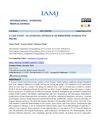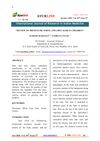July 2024 in “Anais Brasileiros de Dermatologia” Inclusive and culturally competent healthcare is crucial for transgender and non-binary individuals.
December 2022 in “JAMA network open” 5α-Reductase inhibitors may increase depression risk but not dementia or suicide.
[object Object]  January 2017 in “International journal of science and research”
January 2017 in “International journal of science and research” Trichotillomania is a chronic hair-pulling disorder, more common in females, treated with therapy and sometimes medication.
 151 citations,
August 2010 in “British Journal of Dermatology”
151 citations,
August 2010 in “British Journal of Dermatology” Guidelines for diagnosing common hair loss include detailed history, clinical examination, and various diagnostic techniques.
 29 citations,
August 2008 in “Current Opinion in Pediatrics”
29 citations,
August 2008 in “Current Opinion in Pediatrics” Hair loss in teenagers is hard to treat and lacks a cure, with some treatments available depending on the type of hair loss.
 6 citations,
April 2019 in “Endocrinology and Metabolism Clinics of North America”
6 citations,
April 2019 in “Endocrinology and Metabolism Clinics of North America” Testosterone therapy for transmasculine individuals is generally safe with medical supervision, improves mental health, and has mixed effects on physical health.
 36 citations,
May 2017 in “The journal of sexual medicine”
36 citations,
May 2017 in “The journal of sexual medicine” Cyproterone acetate treatment is safe and causes mild feminization, which increases with added estrogen.
 8 citations,
August 2021 in “Lupus Science & Medicine”
8 citations,
August 2021 in “Lupus Science & Medicine” Patients with cutaneous lupus are most concerned about self-consciousness, physical symptoms, and disease progression.
 May 2023 in “BMC Women's Health”
May 2023 in “BMC Women's Health” Many women who have used performance-enhancing drugs in Finland show high rates of mental health and substance use issues, and most have normal red blood cell counts.
 January 2024 in “International Ayurvedic medical journal”
January 2024 in “International Ayurvedic medical journal” The Ayurvedic treatment helped a woman with PCOS, improving her symptoms and menstrual cycle.
 13 citations,
July 2019 in “Pediatric dermatology”
13 citations,
July 2019 in “Pediatric dermatology” Pediatric dermatologists need to understand the unique skin health needs of LGBTQIA youth to provide better care.
 10 citations,
January 2018 in “Seminars in Reproductive Medicine”
10 citations,
January 2018 in “Seminars in Reproductive Medicine” The document concludes that women with PCOS need a comprehensive care model that covers reproductive, metabolic, and psychological health to improve their quality of life.
June 2019 in “Medicine and science in sports and exercise” The runner's bone injuries were linked to untreated Celiac Disease and low energy availability affecting her bone density.
 7 citations,
August 2023 in “EClinicalMedicine”
7 citations,
August 2023 in “EClinicalMedicine” Anti-androgens can help manage some PCOS symptoms better than metformin but are not more effective than placebos or birth control pills for other symptoms.
4 citations,
December 2020 in “Current sports medicine reports” Athletes usually get enough vitamins and minerals from a healthy diet, and supplements are only needed for those with actual deficiencies.
 August 2024 in “Nutrition Bulletin”
August 2024 in “Nutrition Bulletin” GLP-1 receptor agonists help with weight loss but need to be combined with other treatments for best results.
 2 citations,
October 2015 in “Primary Care: Clinics in Office Practice”
2 citations,
October 2015 in “Primary Care: Clinics in Office Practice” Doctors should diagnose hair loss by examining the patient and possibly doing tests, and then treat it based on the type, which may prevent permanent hair loss.
 January 2019 in “Clinical neuropharmacology”
January 2019 in “Clinical neuropharmacology” A girl's hair-pulling condition improved greatly after she started vitamin D treatment.
 October 2020 in “Ayurline: international journal of research in indian medicine”
October 2020 in “Ayurline: international journal of research in indian medicine” Poor quality hair products contribute to premature greying in children.
 42 citations,
June 2015 in “Gynecological Endocrinology”
42 citations,
June 2015 in “Gynecological Endocrinology” Women with PCOS often have mood disorders and a lower quality of life, and treatment should focus on both physical and mental health.
 51 citations,
November 2005 in “Journal of Medical Primatology”
51 citations,
November 2005 in “Journal of Medical Primatology” Alopecia in captive rhesus macaques is affected by season, sex, age, housing, and stress, with complex links between stress hormones and hair loss.

Drinking sweetened tea and poor sleep habits may increase the risk of hair loss in women.
[object Object]  11 citations,
February 2011 in “Current Zoology”
11 citations,
February 2011 in “Current Zoology” About 20% of Japanese macaques had head alopecia, and stress and environment might cause hair loss.

Drinking sweetened tea and poor sleep increase the risk of hair loss in women.

Drinking sweetened tea and poor sleep habits increase the risk of hair loss in women.

Drinking sweetened tea and late bedtimes increase the risk of hair loss in women.

Drinking sweetened tea and late bedtimes increase the risk of hair loss in women.
 11 citations,
December 1987 in “Aesthetic Plastic Surgery”
11 citations,
December 1987 in “Aesthetic Plastic Surgery” The document concludes that the hCG protocol may help in obesity treatment and could be scientifically justified, but more research is needed.
 December 2020 in “International journal of research in ayurveda and pharmacy”
December 2020 in “International journal of research in ayurveda and pharmacy” Eating well and avoiding synthetic hair products are key for healthy hair.
 2 citations,
December 2023 in “JEADV. Journal of the European Academy of Dermatology and Venereology/Journal of the European Academy of Dermatology and Venereology”
2 citations,
December 2023 in “JEADV. Journal of the European Academy of Dermatology and Venereology/Journal of the European Academy of Dermatology and Venereology” The document suggests a new way to categorize skin and mind disorders into two main groups to reduce confusion.

























